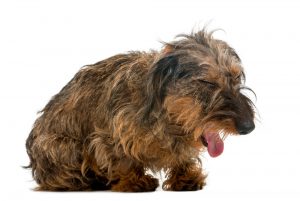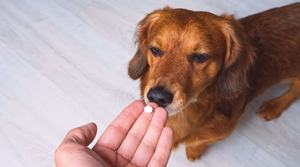
Reviewed & Fact-Checked by
Dr. Chyrle Bonk
Veterinarian (DVM)
Learn more about our Veterinary Review Board »
Is your dog coughing an alarming harsh or dry cough? Does he experience watery discharge from his eyes or has a slightly reduced appetite?
In more severe cases a dog may experience fever, loss of appetite and a moist cough. These are some of the signs of kennel cough in dogs. It is usually a mild illness but if left untreated it can lead to a more serious problem.
Here we are going to take a close look at kennel cough - its symptoms, treatments and recovery.
What is Kennel Cough?
Kennel cough is a very contagious disease that can affect any dog, of any breed, at any time in their life.
In many ways it is a lot like the common cold humans pick up from one another. It is usually, but not always, acquired when your pup has been in close quarters with another infected pup.
It's known as kennel cough because it's common in shelters and in poorly ventilated boarding kennels or grooming facilities.

What Causes Kennel Cough and Are Certain Breeds More at Risk?
Like the human cold, kennel cough can be caused by a number of different factors. One of the most common is a bacteria known as Bordetella bronchiseptica, which is why you may also hear kennel cough referred to as bordetella.
If your pup is suffering from another virus, including the canine herpes virus or the parainfluenza virus they are more susceptible to the Bordetella virus as well.
A pup basically 'catches' kennel cough when they breathe in air particles that contain the virus.
And while the canine larynx is normally lined with a thick mucus that helps to protect them from infection there are some things that weaken that protection.
This includes cold temperatures, exposure to second-hand smoke, and being in crowded conditions like the ones you might find at a boarding kennel or in a shelter. Stress can also play a role in decreasing your dog's immunity.
Kennel cough is a canine disease that does not discriminate, any dog might catch it at any time and no one breed is more susceptible to it than another. Very young, and older dogs, whose immune systems are not as strong, are often at a greater risk for developing kennel cough though.
How Can I Tell If My Dog Has Kennel Cough?
Kennel cough manifests itself as a persistent cough, but one that often sounds more like a loud honk. It sounds different than the occasional hacking cough, and is usually worse with exercise.
Other than the cough most pups show very few other symptoms. They rarely lose their appetites and the cough does not usually affect their energy levels.
In fact kennel cough is usually more upsetting for their owners rather than the dog themselves as the honking cough usually sounds pretty terrifying.
In more severe cases of kennel cough, dogs may experience any of the following symptoms: a white or yellow discharge from the nose and eyes, fever, reduced levels of activity and not wanting to eat.
The cough usually begins 5 to 10 days after exposure and can take up to 3 weeks for it to go away.
How Is Kennel Cough Diagnosed?
If you think your pup may have kennel cough the first thing you should do is separate him from any other dogs, as it is such an infectious disease.
Then call your vet. You may want to forewarn them before taking your pup to their office to avoid infecting an entire waiting room full of other dogs.
Most cases of kennel cough can be diagnosed with a thorough examination. Other more severe cases may require bloodwork and cultures of the airway secretions.
On the whole kennel cough is not considered a particularly serious condition, but if it goes on for too long there is a chance that it could turn into pneumonia, a far more serious problem. Don't hesitate to contact your veterinarian if your dog has a persistent cough.
How is Kennel Cough Treated?
Often dogs do not need any treatment for kennel cough, as they usually recover within a few weeks by themselves.
Sometimes a vet may prescribe a course of antibiotics to help speed recovery if the infected pup is in a higher risk category due to a compromised immune system. Cough medicines or anti-inflammatories may be added for more severe cases.
There are some things that you can do as a pet parent to help make your dog's recovery more comfortable and even perhaps reduce the amount they cough.
Try to keep him in a warm, humid space, making use of a humidifier often helps ease coughing.
When walking your pup use a dog harness instead of a collar to decrease the pressure on the neck.
Ensure your pup rests and has good nutrition.
If your pup suddenly becomes listless, or seems to lose their appetite suddenly call your vet as soon as possible, as these symptoms may indicate a more serious condition. You should also consult your vet if the symptoms of kennel cough persist for more than a month.

Kennel Cough Prevention
There are three forms of vaccinations available that can be useful in reducing the likelihood that a dog will develop kennel cough. They can be given as an injection, nasal mist or an oral dose.
No vaccine is 100% effective, so these vaccines do not guarantee protection. Instead, they will help decrease the chance that your dog will get kennel cough or decrease the severity of the illness if they do.
Some facilities may require a kennel cough vaccination. So, if you are planning to board your dog be aware of the facilities vaccination policy.
Other preventative measures you can take are keeping your dog away from others that are ill, not sharing toys with other dogs, and avoid communal areas such as dog parks if your dog is very young or has any immune system issues.
Also Read: Which Vaccinations Do Dogs Need?



